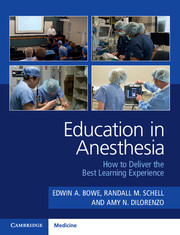Book contents
- Education in Anesthesia
- Education in Anesthesia
- Copyright page
- Contents
- Contributors
- 1 Creating (and Choosing) an Optimal Learning Environment
- 2 Learning Styles in Anesthesiology Education
- 3 Clinical Reasoning
- 4 Curriculum Development
- 5 Time-Efficient Teaching Strategies in Anesthesia
- 6 Teaching in the Preanesthesia Clinic*
- 7 Teaching in the Operating Room
- 8 Teaching in the Intensive Care Unit
- 9 Pain Medicine Education in Anesthesiology Training
- 10 A Foundation for Teaching Airway Management
- 11 Teaching and Learning Regional Anesthesia
- 12 Teaching Transesophageal Echocardiography
- 13 Teaching Point-of-Care Ultrasound (POCUS) to the Perioperative Physician
- 14 How to Design Multimedia Presentations
- 15 The Interactive Classroom
- 16 E-Learning in Anesthesiology
- 17 The Role of Simulation in Anesthesiology Education
- 18 Test-Enhanced Learning: Using Retrieval Practice via Testing to Enhance Long-Term Retention of Knowledge
- 19 Teaching Professionalism during Anesthesiology Residency
- 20 Providing Feedback
- 21 The Resident as a Teacher
- 22 Teaching Quality and Safety
- 23 Teaching Residents How to Critically Read and Apply Medical Literature*
- Index
- References
20 - Providing Feedback
Published online by Cambridge University Press: 06 April 2018
- Education in Anesthesia
- Education in Anesthesia
- Copyright page
- Contents
- Contributors
- 1 Creating (and Choosing) an Optimal Learning Environment
- 2 Learning Styles in Anesthesiology Education
- 3 Clinical Reasoning
- 4 Curriculum Development
- 5 Time-Efficient Teaching Strategies in Anesthesia
- 6 Teaching in the Preanesthesia Clinic*
- 7 Teaching in the Operating Room
- 8 Teaching in the Intensive Care Unit
- 9 Pain Medicine Education in Anesthesiology Training
- 10 A Foundation for Teaching Airway Management
- 11 Teaching and Learning Regional Anesthesia
- 12 Teaching Transesophageal Echocardiography
- 13 Teaching Point-of-Care Ultrasound (POCUS) to the Perioperative Physician
- 14 How to Design Multimedia Presentations
- 15 The Interactive Classroom
- 16 E-Learning in Anesthesiology
- 17 The Role of Simulation in Anesthesiology Education
- 18 Test-Enhanced Learning: Using Retrieval Practice via Testing to Enhance Long-Term Retention of Knowledge
- 19 Teaching Professionalism during Anesthesiology Residency
- 20 Providing Feedback
- 21 The Resident as a Teacher
- 22 Teaching Quality and Safety
- 23 Teaching Residents How to Critically Read and Apply Medical Literature*
- Index
- References
- Type
- Chapter
- Information
- Education in AnesthesiaHow to Deliver the Best Learning Experience, pp. 224 - 231Publisher: Cambridge University PressPrint publication year: 2018

